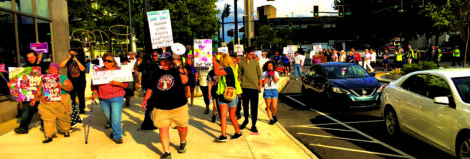Some on Youngstown City Council oppose $625K ambulance subsidy
Some on board oppose $625K ambulance subsidy
YOUNGSTOWN — Some city council members oppose a $625,000 subsidy to AMR Ambulance to provide ambulance service in Youngstown.
But a vote will have to wait until next Monday as council canceled its Wednesday meeting.
The issue was the topic of a lengthy discussion at council’s Monday finance committee meeting.
Council members Julius Oliver, D-1st Ward; Lauren McNally, D-5th Ward; and Anita Davis, D-6th Ward, said they opposed the subsidy as the city already has a contract in place with AMR to provide ambulance service to the city through the end of the year.
The proposed legislation would pay a $62,500 monthly subsidy from American Rescue Plan funds retroactive to March 1 for a total of $625,000. It needs four votes to be approved, so if one more council member opposes, it would be rejected.
The funding request was made because an average ambulance run costs about $300 and Medicaid reimburses about $130 so AMR is losing money, Ed Powers, the company’s regional director, said. He said about 54 percent of all ambulance calls in the city are for Medicaid recipients.
“We’re in the middle of a contract and they’re coming to us,” Davis said. “We’re supposed to supplement the largest ambulance company in the country? They can come back to us in January.”
McNally said: “We’re just subsidizing them without any evidence it’s been better.”
Councilwoman Samantha Turner, D-3rd Ward, said she would support the contract if it is effective May 1 and not retroactive.
She also wants to see the administration seek proposals from other ambulance companies for next year, and a study to help determine if the city should develop its own ambulance service.
The additional money would provide four round-the-clock ambulances in the city. Currently it has three.
Some council members said they believed the city was getting four more ambulances and not four total.
“How is supplementing their loss going to get us better service?” Oliver said.
Even those who said they were undecided about their vote questioned the subsidy.
“Is this a money grab for ARP funding?” Councilman Mike Ray, D-4th Ward, asked. “Can I tell my boss I don’t spend well so give me more money?”
Councilwoman Basia Adamczak, D-7th Ward, also questioned if the request is because the city has $82,773,370 in ARP funding.
“I’m still undecided,” she said. “I was initially understanding, but after (Monday) it sounded misleading, like we were getting four more ambulances. I have to think about it some more. I’m 50-50.”
Powers said he’s been discussing a subsidy with city officials for about three years.
Fire Chief Barry Finley said if the city wanted to create its own ambulance service it would take a year to get off the ground. He also said AMR has done a good job in the city.
City officials previously had said the startup costs for a city-run ambulance service would be about $8 million.
Council members said with a subsidy in place, the city can look for a different company to provide ambulance services starting Jan. 1.
MEETING CANCELED
Council canceled its Wednesday meeting because Tom Hetrick, its president, cannot attend as he has COVID-19, Ray said. Also, Ray said he cannot attend the meeting as he’ll be out of town on business.
Rather than meet on Wednesday, council rescheduled the meeting for 3:30 p.m. Monday.
One item to be considered at next week’s meeting is a $649,912 reimbursement using ARP funds to the city’s self health insurance plan for COVID-19-related employee medical expenses.
The matter was tabled at the March 2 meeting, but appears now to have council’s support.
SPEED CAMERAS
Council will vote next week on a plan to put unmanned speed cameras in school zones.
The proposal has met with support from council members.
A study done last year by Blue Line Solutions — the Chattanooga, Tenn., company, that will have a contract with the city for the cameras — showed that 21.3 percent of motorists monitored over a five-day period in school zones were going at least 11 mph over the speed limit.
The contract would be for three years and extended for two-year periods at the option of the city. Either party can terminate the contract with 30 days’ notice, but the city is locked in for two years unless it pays a $75,000 per system penalty to leave before that. The contract didn’t detail how many systems there are.
The city would get 65 percent of the money collected from speeders with Blue Line receiving the remaining 35 percent.
The city’s police department used hand-held speed cameras, almost exclusively on Interstate 680 between South Avenue and Meridian Road, from August 2015 until November 2019.
It discontinued the program after the state Legislature approved a bill that reduced a municipality’s Local Government Fund money by the amount it received from the hand-held cameras.
The city received about $2.2 million in speed-camera money in 2019 compared to about $1.7 million in LGF. The city ended the speed-camera program because the camera money was exclusively for police equipment purchases and to pay the salaries of officers on that duty, who primarily did so on overtime at time and a half. LGF money goes into the city’s general fund.
There is an exemption to the LGF deduction for cameras in school zones, according to the city’s law department. But money collected by the city for school-zone speeders can only be used for school safety resources.
Speeders would face civil penalties of $100 for driving at least 11 mph over the speed limit, $125 for 12 to 19 mph over the limit and $150 for those driving at least 20 mph over the limit. They would not get points on their driving record for the civil citations.
Also, the contract calls for a $5.90 fee for using credit cards to pay the citations with Blue Line keeping all of that money.




